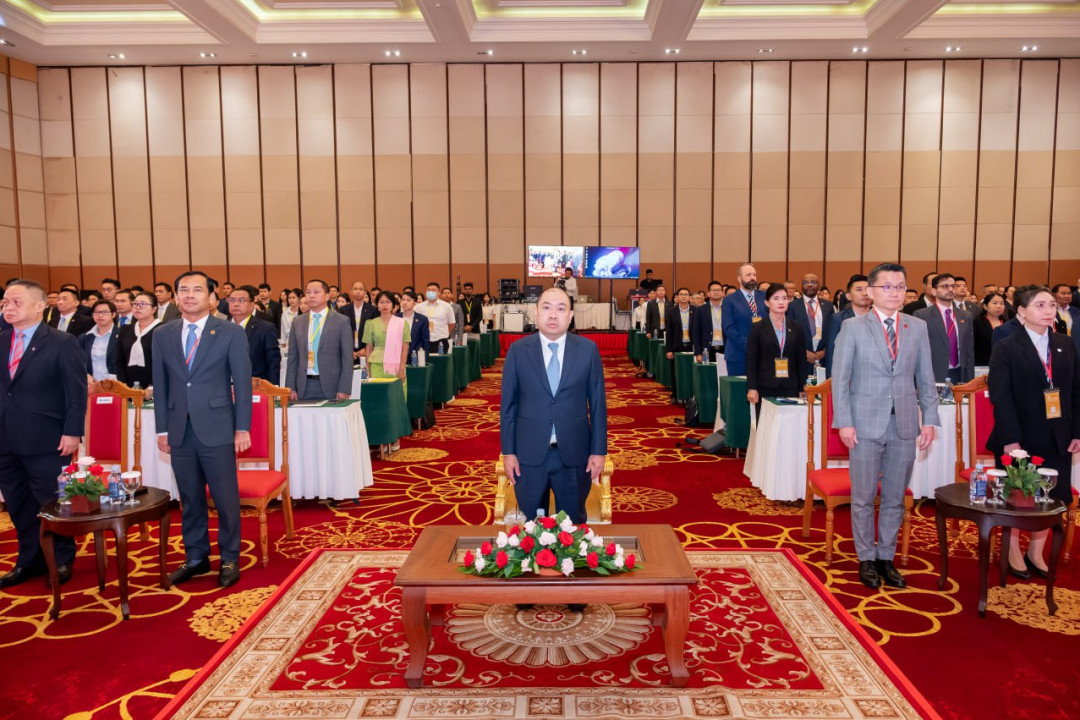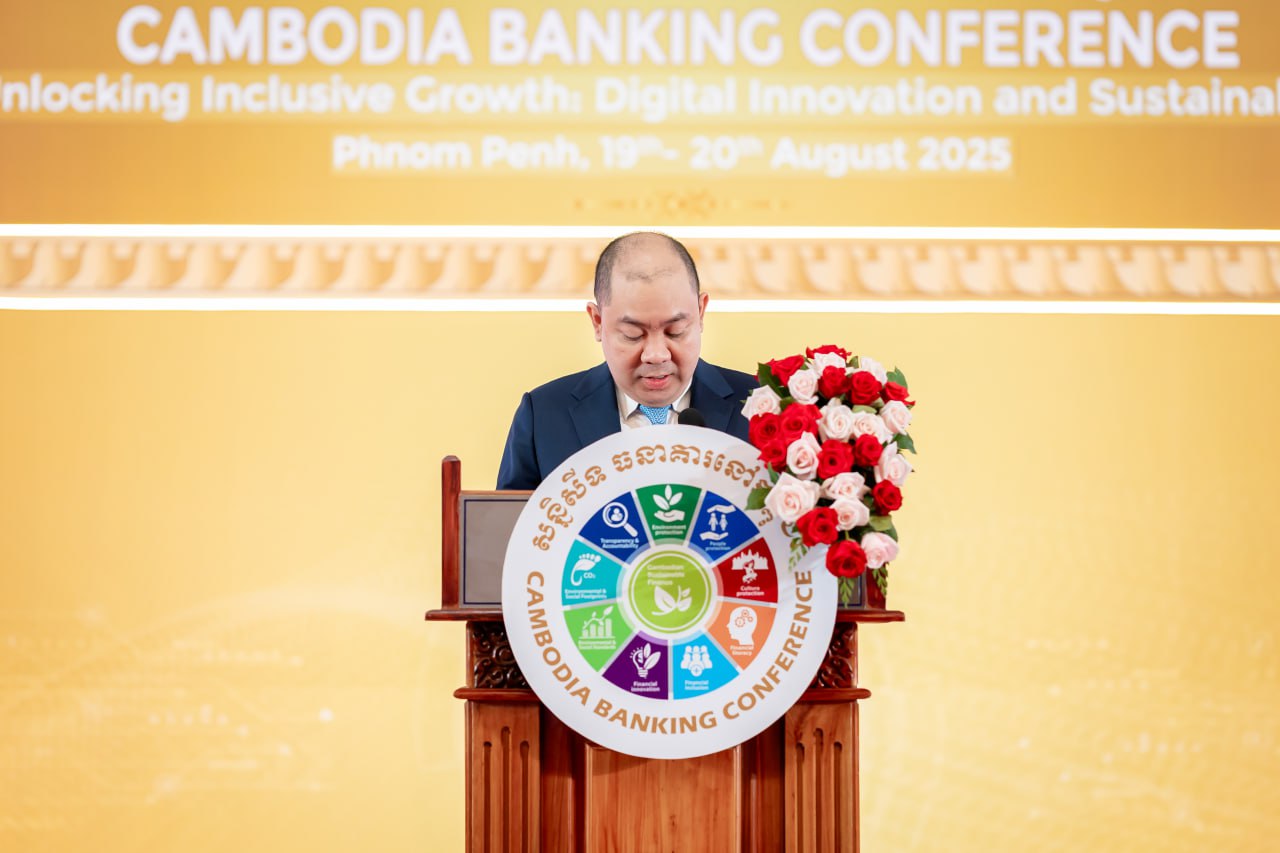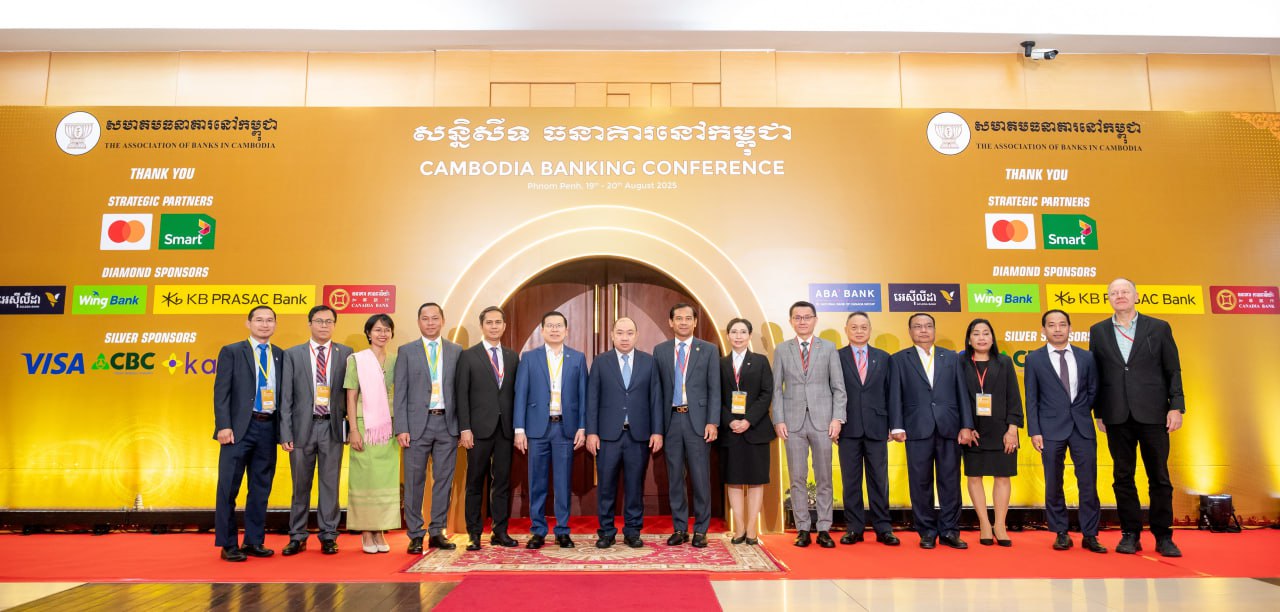ABC 4th Cambodia Banking Conference 2025 Spotlighted Digital Innovation, Sustainability, and Inclusive Growth

The Association of Banks in Cambodia (ABC), with support from the National Bank of Cambodia (NBC) and the ASEAN Bankers Association (ABA), hosted its 4th Cambodia Banking Conference on August 19–20, 2025, at Sokha Phnom Penh Hotel, under the theme “Unlocking Inclusive Growth: Digital Innovation and Sustainability".
The conference was presided over by H.E. Kith Sovannarith, NBC Director General of Banking Supervision; Paul Gwee Choon Guan, ABA Secretary General; Rath Sophoan, ABC Chairman; Raymond Sia, ABC Vice Chairman; and Sharad Jain, Country Manager of Mastercard for Vietnam, Laos, and Cambodia.
This year’s conference convened more than 800 leaders, with 500 participating in person and 300 joining online. Participants included representatives from ASEAN Member States, telecommunications operators, financial institutions, government agencies, and policymakers. Distinguished experts from the government, financial institutions, World Bank, Asian Development Bank (ADB), International Labour Organisation (ILO), and Women’s World Banking contributed their insights in key trends shaping the future of the banking sector.
NBC’s Director General of Banking Supervision, H.E. Kith Sovannarith, said unlocking inclusive and sustainable growth requires more than strategies, policies, and technologies; it demands active collaboration across government, private sector, civil societies, and international partners. He added that the pentagonal strategy provides Cambodia with a national roadmap, NBC provides the industry roadmaps and supportive regulations—and to some extent, platforms for financial innovation—while partnerships with the private sector translate these strategies into lasting changes for Cambodian people.

Addressing participants, ABC Chairman, Rath Sophoan, stated that the financial system today is complicated and always changing, with new key trends including financial technology (FinTech), digital currencies, decentralised finance, and environmental, social, and governance (ESG) banking.
“This year’s conference highlights how Cambodia’s banking industry can leverage technology and sustainable finance to drive inclusive economic growth,” he said.
Paul Gwee Choon Guan, Secretary General of the ASEAN Bankers Association (ABA), said in his keynote address, that ASEAN is navigating a period of rapid transformation. Technology is reshaping the way we serve our customers, sustainability is redefining the way we measure progress, and inclusion is reminding us that growth must benefit everyone.
"The ASEAN Bankers Association remains committed to working with our Association’s members to promote cross-border collaborations, share best practices, and develop innovative solutions that address both local challenges and regional opportunities”, he said.

The two-day conference aligned with the National Financial Inclusion Strategies (NFIS) 2019/25, and had a focus on digital economy and sustainable growth. It served as a collaborative platform for policymakers, industry leaders, and innovators to address key topics and build connections in the financial sector. Main discussions covered:
- Cambodia’s Economic Outlook 2025: U.S. Tariffs, Cambodia’s border tensions, the slowdown of global economic growth, were components affecting Cambodia’s export performance, in addition to the slowdown in tourist arrivals. The stress was put to restore competitiveness, diversify markets, strengthen SMEs, promote digital transformation, improvements in business climate, and deepen ASEAN integration and seamless cross- border payments.
- Sustainable Finance & ESG: Cambodia’s progress on Sustainable Finance Taxonomy, ESG risk management, and climate risk frameworks. Balanced ESG regulations would drive green investments and economic growth. While NBC, the Ministry of Environment, and banks & financial institutions are working to advance in ESG and green lending, capacity building remains at the core in order to build an inclusive, resilient, and climate-smart financial ecosystem.
- Cybersecurity & Future of Payments: cybersecurity risks were also flagged, with calls for proactive AI-driven responses to an increasingly complex threats and personalisation, the risks of misinformation, bias, privacy concerns, and a call for responsible use frameworks. Experts also emphasised the future of secure digital transactions, best practices, and industry collaborations.
- Artificial Intelligence in the Banking sector: AI in banking can greatly enhance personalisation, efficiency, and customer trust, but it also carries risks related to information integrity and privacy. They stressed the importance of vigilance in data use and called for collaborations amongst government, industry, and technology experts to ensure responsible AI with proper oversights and accountabilities.
- Fraud Prevention: Fraud has evolved and is becoming very complex. It is not just financial losses, but it erodes trust from public and customers. A stronger digital literacy, vigilance, and industry cooperation are a must.
- Digital Wage Payments: this is to promote efficiency, transparency, and financial inclusion through better infrastructure, policies, and digital literacy.
- Women & Inclusive Finance: Advocating for equitable access, gender-sensitive product innovation, data collection, and stronger public-private collaboration.
“Together, we must first expand digital infrastructure, financial literacy, and consumer protection, so that every Cambodian can access finance equitably. Second, mobilising green finance to further accelerate sustainable development, and third, build trust and transparency in financial services, ensuring that innovation is safe, responsible, and inclusive,” concluded H.E. Kith Sovannarith.
This press release was supplied.